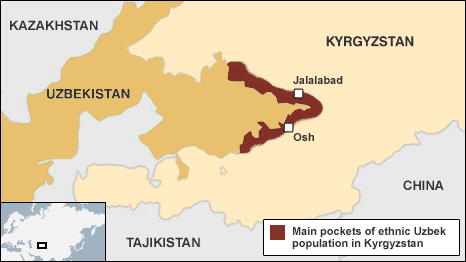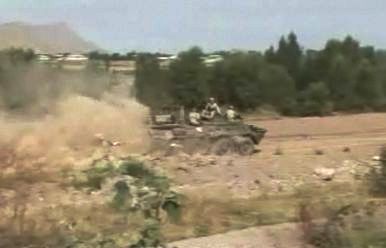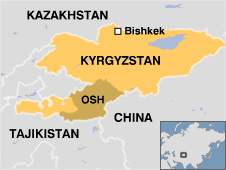 “In order to improve security and reduce tension in South Kyrgyzstan, security operations have to abide by international human rights standards,” the observers underlined. “Such kind of abuses will only fuel conflicts between Uzbeks and the Kyrgyz authorities.
“In order to improve security and reduce tension in South Kyrgyzstan, security operations have to abide by international human rights standards,” the observers underlined. “Such kind of abuses will only fuel conflicts between Uzbeks and the Kyrgyz authorities.
Removing or destroying passports of Uzbek citizens also means that they will not be able to participate in the 27 June Referendum on a new and more democratic Constitution.”
Brutal violence
Residents in Nariman were in a state of shock, speaking of brutal violence carried out by forces who entered the largely Uzbek populated village around 6 am, and left around 11 am. At Hospital Nr. 1, there were scenes of despair as severely beaten men arrived, explaining how police forces had stormed into their houses, beating them with machine guns and tearing up their passports.
One, 56-year old Bakhadyr Juraev, was severely injured by a shot to the upper chest, and died on the way to the local hospital. The observers from NHC and Memorial witnessed the anguish of a woman whose husband, Sharabiddin Dosmatov, had been beaten to death. The woman broke down wailing when she was shown the body, which was later collected by family members.
Speaking to the great numbers of local residents who had gathered at the hospital, as well as visiting a number of houses in the outlying streets, the observers found the local population fearing for their lives, terrified at what the next night might bring.
One resident of Suleimanova Street, Rozibai, was among the many being treated at the hospital for injuries sustained from beatings.
Rozibai explained that he had heard shooting when the police approached around 6 am. Several helicop ters were hovering over the village, and great numbers of armed personnel entered the village. He opened the door when police knocked, and was immediately struck to the head with the end piece of an automatic weapon. His son, also being treated at the hospital, was beaten to the ground and his passport was torn up. According to the two, the police stole all valuables in the house, including their money.
ters were hovering over the village, and great numbers of armed personnel entered the village. He opened the door when police knocked, and was immediately struck to the head with the end piece of an automatic weapon. His son, also being treated at the hospital, was beaten to the ground and his passport was torn up. According to the two, the police stole all valuables in the house, including their money.
Another man, Ravshanbek, told a similar story. He woke up to see armed men jumping over the fence of his backyard. When he came out of his house, he was ordered to lay down on the ground. One of the men kicked him in the head, breaking his glasses. Around 9 am the man tried calling the emergency line 102 to the police, explaining what was happening, but was told by the operator that “they deserved it”.
Burned up passports
One woman explained that there were three groups of police – the first wore black hoods, and only carried out passport controls. The second and third groups beat up her husband, Shkrulo, and her two sons, Asatelo and Ismatelo. Another resident on Suleimanova Street explained that the forces had beaten him up, saying that this was their land and that he should leave. His passport had been partially burned up.
The observers also visited 37-year old Aibek, who was lying bloodied in the bed of his house. He too provided a passport that  had been partially burned.
had been partially burned.
He explained that he had opened the door when the police came around 6 am, telling them that he had nothing to do with politics, and had worked for many years in the government service as a construction builder. The police checked his house, took his mobile phone and then started beating him with automatic rifles. Aibek said he was scared what the next night would bring, and that he felt he could trust no one anymore.
A great number of people showed the observers their homes and backyards, where there were clear signs that police had broken windows, televisions and other items.
Danger of arrest
Burning or tearing up passports puts residents in danger of arrest and further violence. At this time it is absolutely necessary to carry a passport in Osh – those who do not carry their passport or observe the 6 pm curfew are liable to be arrested and charged in criminal cases.
It is descriptive of the situation that the observers were stopped 6 times in each direction when travelling to Nariman from the center of Osh, each time being requested to show their passports by armed security forces.
Minister’s of Defense visit
Around 1:30 pm, the Deputy Minister of Defense of the Kyrgyz Republic, Mr. Talaibek Umaraliev, arrived to the village hospital in a tank, accompanied by armed soldiers. He spoke with the local residents, noting their wish that local police forces should be removed from the area, as local residents do not trust them.
Umaraliev said the operation had been carried out by the Ministry of Interior. He promised that an investigation would be initiated to establish the facts. He told those who had torn or burnt passports to keep them for evidence.
The Commander’s Headquarter in Nariman declined to comment on the matter, referring to th e official press service.
e official press service.
The observers from Norwegian Helsinki Committee and Human Rights Center Memorial later returned to the center of Osh, where they followed another large-scale “clean-up operation” carried out by government forces along Internatsionalnaya street between 5 pm and 6 pm. Groups of 10 or more soldiers entered each house along the street, checking passports and searching for weapons. For the time that the observers were present, this operation was handled correctly, without incidents of violence or brutality.
A curfew is imposed in the city of Osh, and no one may walk the streets after 6 pm.
HRH Oslo, based on Norwegian Helsinki Committee article.
Related links:
Kyrgyzstan: International support necessary to restore order, provide humanitarian aid and democracy





